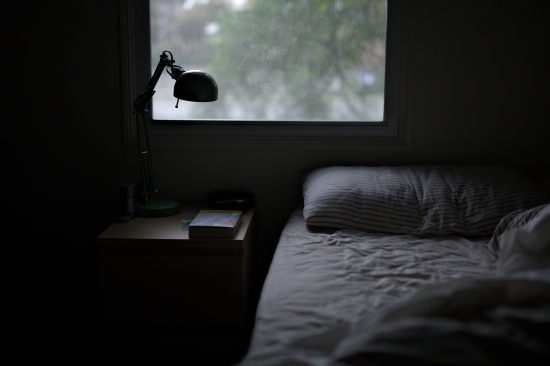
I’m not the type to sleep late—seven o’clock is late for me—but I don’t like waking up. Being pulled from the womb of sleep by an alarm clock is almost always a jarring and disorienting experience. Unfortunately, almost every day, it’s the first thing that happens.
Each day begins in a small cloud of mild existential confusion, as it takes a few seconds to remember where this morning fits in the context of my life—what day it is, what happened yesterday, and which of my apparent life circumstances were just dream figments. Oh good, I didn’t ruin my laptop in a bubble bath yesterday. Oh right, I didn’t co-host a dinner party with Patrick Stewart last night. *This cloud of confusion can be almost comically extreme for me; optional anecdote in footnote.
Each day begins with two simultaneous upsetting developments. Not only does the glorious experience of sleep come to an end, but you’re summoned to the captain’s chair of waking life at the exact time your mind and body are least interested in the job. In a flash, the comfort and freedom of sleep transmute into the thankless conundrum of being a person who has work to do and responsibilities to attend to, the first of which is getting your groggy body to its feet. Read More

The other day I saw an ad for Google Home which, even five years ago, could have passed for their annual April Fool’s joke. (You can see it here.)
A woman is getting comfortable on a couch, as a friendly voiceover relates a supposedly-common dilemma:
“You know when you’ve got Chinese takeout on your chest, and the blanket around your feet, and then you realize the remote is on the other side of the couch? Just say ‘Hey Google, play Stranger Things!’”
I appreciate ease and convenience (and Stranger Things) as much as anyone else. We should be grateful to have access to ingenious devices that relieve us from having to do laundry in a stream, heat water by the potload over a fire, and other laborious, dangerous, and time-consuming tasks.
But when we’re also employing futuristic devices to do the easiest imaginable things, we’re probably making our lives worse. How convenient do we want things to be, really? Would we eliminate all bodily movement if it were possible?
If a remote control sitting on the far arm of the couch has become a dilemma we want technology to solve for us, we may be heading straight into the realm of Wall-E, or a similar dystopia. Convenience tech has a way of giving ourselves a fish, so to speak, at any cost. The more we rely on technologies to stand in for our own abilities, for what our brains and bodies know how to do, the worse we get at using those brains and bodies on their own. Read More

Sometimes, improving one small, seemingly obscure skill can make you better at dozens of things at once.
One time at a backyard get-together, I was chain-eating potato chips, when a well-meaning friend made a useful observation. At a natural break in our conversation, he said, “You’re a sucker for bowls of chips aren’t you?”
He meant no offense by this, and I took none—we are both observers of human behavior. I knew I liked chips, but I hadn’t realized quite how unhinged my chip-eating is compared to the people around me. Most people will graze on chips when they’re around, a few at a time, but I tend to fall into a whirlpool of near-continuous chip eating. I spoil my appetite. I park near snack tables and mingle from there.
Interestingly, I wouldn’t describe myself as a fan of potato chips, and I only really eat them at get-togethers. I don’t derive any real joy from eating them, the way I do with chocolate, or spring rolls. For whatever reason I just have a repeating, mechanical habit of reaching into nearby chip bowls when they’re around. Read More



 I'm David, and Raptitude is a blog about getting better at being human -- things we can do to improve our lives today.
I'm David, and Raptitude is a blog about getting better at being human -- things we can do to improve our lives today.
It all pretty the opposite if you're not in the US :) Since 2022 I've changed 3 countries and I'm planning to emigrate to the fourth one. I've had so much novelty and so many things to adapt to. However, time had never run so fast for me as in 2022...